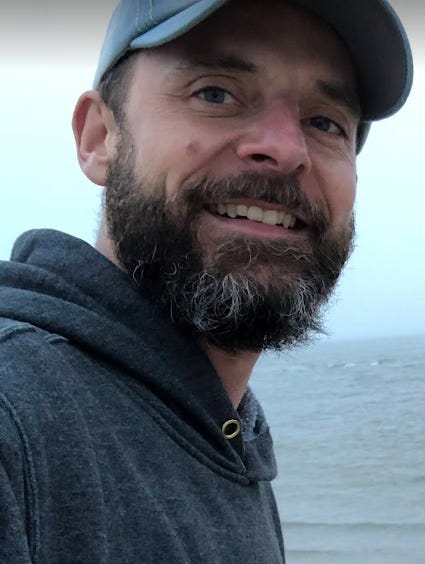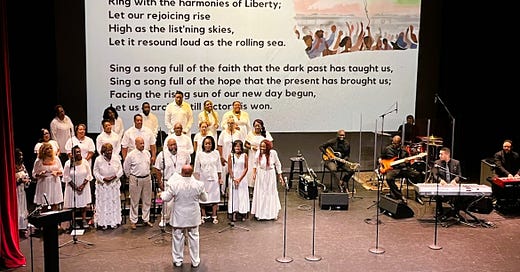Day 16: Rise, Celebrate, and Speak
We step off the bridge, but let us keep striving forward toward what we believe in.
This has been a complicated week for America, and many are discouraged. While it feels like our land cracks around us, I am encouraged that we have crossed this year’s bridge of lament together. As I think about the Fourth of July, I appreciate those who fought for our independence and who have improved our country, and I hold onto hope for the nation, even as the complications press in. I see the words of Toni Morrison:
“There is no time for despair, no place for self-pity, no need for silence, no room for fear. We speak, we write, we do language. That is how civilizations heal. I know the world is bruised and bleeding, and though it is important not to ignore its pain, it is also critical to refuse to succumb to its malevolence. Like failure, chaos contains information that can lead to knowledge—even wisdom. Like art.”1
Nationally known author Robert P. Jones calls this Juneteenth-to-Independence-Day period an opportunity for “Critical Patriotism,” a time in which to “develop new rituals that include the creative interplay of lament and celebration, reckoning and repair, truth-telling and dreaming.”2
Author and Pastor Duke Kwon has called this time “an annual 16-day season of national remembrance, lament, and renewal.”
Yesterday, Dr. Anika Prather termed our crossing “Liberation Season,” a time when “We ALL can celebrate our country’s constant fight to be a free society for all people.” That fight rages at the highest levels of our government while we cross this bridge. And it works itself out in our daily lives. America’s ideals of equality, dignity, and freedom are good. Let’s continue to encourage each other, to write, and to speak—and we will be strong.
We may feel like the walls are squeezing in, that the ceiling is crashing down, but we must work together and remember what we believe in. To fight for a “future where equal means equal,” as Rebecca D. Martin shared with us at the start of our journey on Juneteenth. She walked us into our “lament for the lost chances,” and our readings this year have “looked to the changemakers in our city’s history, who are a compass for us toward life, and change, and love.”
One of those changemakers was Bev Cosby who, as Randy Nelson told us on Day 14, took “courageous seizure of an unforeseen opportunity to change the hearts, consciousness and perspectives of so many people who were no longer willing to be captives of a grossly segregated community.” May we do the same.
…let’s celebrate what brought us to this place, and then help those coming next. Keep striving forward with love, with words, and with language as Toni Morrison says.
This year’s Bridge Crossing in review:
On Day 2, local architectural historian Travis McDonald gave us a glimpse of the origins of that segregation in the vast enslaved labor that went into the antebellum built environment: “The practice of buying, selling, or renting skilled enslaved or free black craftsmen was a critical factor for construction in any community.”
And on Day 3, we remembered that slavery cannot be written off as a wrong done by an isolated group. I wrote that “With all the reverence due God’s work through this “place of calm and beauty,” … “there is an accounting to be told of his people’s complicity with slavery and segregation. Except for the city’s founding Quakers, historic Lynchburg churches perpetuated the same racial hierarchy as other institutions across our nation.”
Over the following days, I focused on God’s beautiful work in bringing Court Street Baptist Church out of that racism. Court Street Baptist, the historic African American church and mother church of many Black churches in town, is a testament to the strength of the city. I shared the words of Vivian Camm, member of Court Street Baptist Church and the first African-American and first woman to serve as deputy superintendent of the Lynchburg Public School System who calls the members of the church “a resilient people who have weathered the storms of slavery, civil war, Jim Crow, segregation, and racism.”
T.J. Anderson III moved me on Day 7 with his tribute to his great grandfather, city councilman Thomas Jefferson Anderson who cared for the local city cemetery. Anderson III’s words echo Isaiah the prophet of Christian scripture, “all men are like grass…the grass withers and the flowers fade…”:
“But they are under the dirt now, no longer stepping
out of wagons and Model-T Fords,
wearing bonnets or wide brimmed hats
to block out the sun. The heat is on them,
on this land where you pushed your clippers
under the compost of leaves,
and city council papers
where you pushed your pen
and signed your name.”
Tom Gerdy, shared with us on Day 8 that “The key is to make sure you are paying attention, because you never know what you might learn or how you might be changed.”
On Days 9 and 10, Jeremiah Forshey called attention to Lynchburg's iconic Confederate statue. Placed in front of the city’s courthouse it says, “in these halls, white justice rules.” White supremacy enslaved people in our nation. But a shape-shifting white supremacy lived on in the hearts of the people erecting that statue. Forshey further revealed the secrets clinging within that concrete, “This poem—all these mementos—like the word placed under a statue’s tongue to animate a golem—tells us what spirit and purpose the statue held in the eyes of the people who erected it.” He goes on to say, “There is no reconciliation without repentance, and no one can repent something while celebrating it.” Shivers run up my spine at his challenge.
This week, we read about the dignity, ownership, and goodness of America.
On Day 11, Rebecca D. Martin brought us back into contact with local famed poet Anne Spencer:
Earth, I thank you
for the pleasure of your language
You’ve had a hard time
bringing it to me
from the ground
to grunt thru the noun
To all the way
feeling seeing smelling touching
—awareness
I am here!
Rebecca noted, “The endurance of her ancestors has given her this ‘feeling seeing smelling touching—awareness,’ this very life she lived here in Lynchburg, Virginia, from 1882-1975. I think she is recognizing all the perseverance, the hard work and the hope, that have brought her to this place in time where she is in conversation with, among others, famed Harlem Renaissance poet Langston Hughes.”
And on Day 13, Cat Hutchison quoted author Karen Washington, who exposits that “we [the African American community] brought the essence of ‘the American.” Cat asks, “What does she mean by this?” And then speculates: “the fight for freedom, the cultural melting pot, the strength gained through adversity.”
On Day 14, Randy Nelson shared about local hero Bev Cosby who “...felt an urgency to undertake every challenge, to take the next step to make life better for every person in our city.”
And yesterday, Dr. Anika Prather taught us how “Liberation Season, celebrated from June 19th to July 4th is [her] time as a family to celebrate America’s messy, horrible, triumphant, beautiful, faltering, sinful, vigorous, and courageous fight to be the land of the free, and to honor the many lives sacrificed to make sure we all can sing “Lift every voice and sing, till earth and heaven ring, ring with the harmonies of Liberty!” AND “Our country tis of the sweet land of LIBERTY, of thee I sing!”
“Sometimes our hope feels flightless. Sometimes it feels like all we do is sing a small song in this life. And maybe that’s true. But Anne [Spencer] kept singing.”
-Rebecca D. Martin
This year’s essays and poems proclaim the hard work of so many that brought us to today. Before we fade like the grass, let’s celebrate what brought us to this place, and then help those coming next. Keep striving forward with love, with words, and with language as Toni Morrison says. In the words of Prather,
“Forms of slavery still exist, but just like our ancestors fought against it to finally bring it to an end, we must continue the work of rooting out its progeny, like redlining, sundown towns (I used to live in one and was stopped by police), inequitable education, voting rights, discrimination on the job, and so much more. As they worked to remove actual slavery, we must work to remove its shadows. We are given the freedom to speak out on the changes that still need to be made and we must not give up on that work. This is why we celebrate Juneteenth.”
Thank YOU, the readers who crossed this bridge with us. Special thank you to Rebecca D. Martin and Elisa Forshey who formatted the essays and poems on Substack. Special thank you to Beatrice Hunter of Lynchburg's Local History & Events, It Takes A Village, and Rev. Dr. Ernest P. Scott of Court Street Baptist Church for pre-reading for us. And thank you for the encouragement and prayers from my friends at The Center for Formation, Justice, and Peace, as well as from the Racial Reconciliation Group (RRG).3
If you are local to Lynchburg and would like to join an in-person group such as the RRG to discuss these topics, learn from each other, and seek reconciliation, healing, and peace, please reach out to me at bridgeoflament@gmail.com.
Finally, I return to words from Isaiah, as a word of hope that whether America strengthens, weakens, or dies (and it will someday), there is a firmer foundation to seek:
A Voice Says “Cry!”
And I said, “What shall I cry?”
All flesh is grass, and all its beauty is like the flowers of the field.
The grass withers, and the flower fades when the breath of the Lord blows on it;
surely the people are grass.
The grass withers, the flower fades, but the word of our God will stand forever.”

Toni Morrison, “No Place for Self-Pity, No Room for Fear,” The Nation, 23 Mar. 2015.
RRG (Racial Reconciliation Group) is a diverse, faith-based, grassroots community focused on building relationships with individuals, churches, and organizations for racial healing and justice. All are welcome to join us. Focus areas of education, service, and policy guide our efforts and all are undergirded by prayer. Over the last four years, we have met weekly to listen to each other in humility, build understanding, lift each other, and act to make positive change—to be the change we wish to see continue in the world.





Thanks for your leadership on this project, Kenton.
It's been a good, hard, worthwhile journey this year.